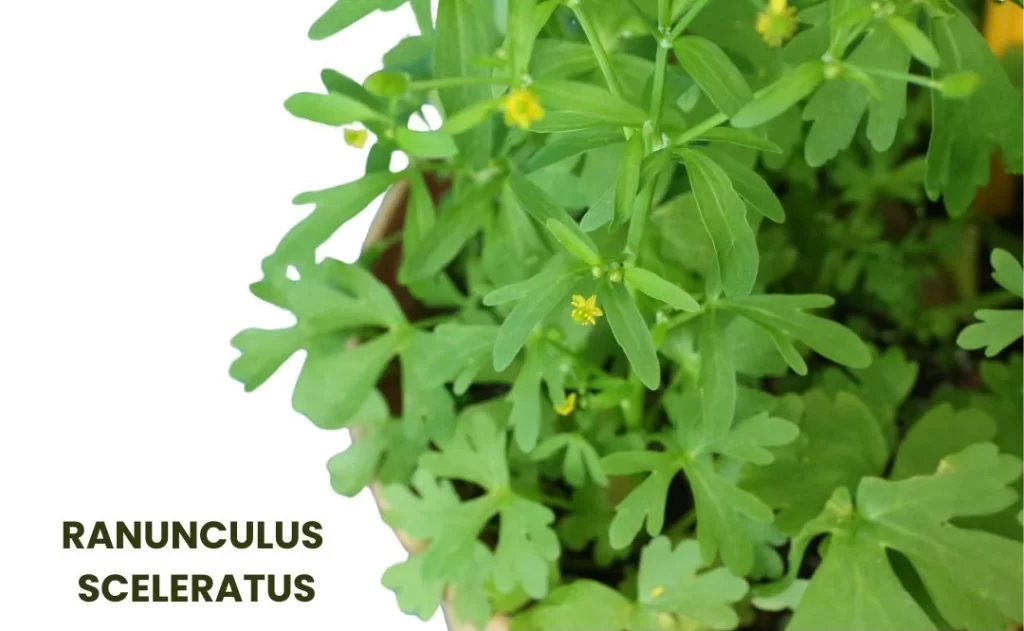Ranunculus Sceleratus, commonly known as Marsh Buttercup, is a plant from the Ranunculaceae family.
It is notable for its highly irritating properties, particularly affecting the skin and mucous membranes.
This remedy is characterized by gnawing, boring pains, and is effective in treating skin eruptions and periodical complaints.

SOURCE INFORMATION
Scientific Classification
- Kingdom: Plantae
- Clade: Angiosperms
- Clade: Eudicots
- Order: Ranunculales
- Family: Ranunculaceae
- Genus: Ranunculus
- Species: R. sceleratus
Origin and Historical Facts
- Ranunculus Sceleratus is native to wet, marshy areas in the Northern Hemisphere.
- It has been used in traditional medicine for its powerful irritant properties.
- Historically, it was used externally for its blistering effect and internally in highly diluted forms for various complaints.
Geographic Distribution
- Found in wet, marshy areas across Europe, Asia, and North America.
Active Constituents
- Contains protoanemonin, which is responsible for its blistering properties.
Pharmacological Properties
- Highly irritant, with a strong affinity for the skin and mucous membranes.
DRUG PATHOGENESIS
- Ranunculus Sceleratus primarily affects the skin, causing vesicular eruptions and acrid exudations.
- It also impacts the gastrointestinal system, producing gnawing and boring pains.
- Additionally, it affects the respiratory system and extremities with specific pain patterns.
KEY CHARACTERISTICS
- Highly irritating to the skin: Causes vesicular eruptions and large blisters.
- Gnawing and boring pain: Notable in various parts of the body, particularly the head and extremities.
- Periodical complaints: Symptoms that occur at regular intervals.
- Fainting with stomach pain: An unusual but notable symptom.
DETAILED ORGAN SYMPTOMS
MIND
- Frightful Dreams: Dreams about corpses, serpents, and battles.
HEAD
- Gnawing Pain: Particularly in one spot on the left of the vertex.
- Fluent Coryza: Accompanied by sneezing and burning micturition.
MOUTH
- Sensitive Teeth and Gums: Increased sensitivity in the oral cavity.
- Mapped Tongue: Presence of denuded patches on the tongue.
- Burning and Rawness: Sensation of soreness and rawness in the mouth and tongue.
ABDOMEN
- Sensation of a Plug: Behind the umbilicus and right false ribs.
- Liver Pain: Pain over the liver region with a sensation as if diarrhea would occur.
- Pressure Sensation: Behind the right false ribs, worse with deep inspiration.
CHEST
- Sensitive Integument: Skin sensitivity in the chest area.
- Bruised Pain and Weakness: Notable every evening.
- Sore Burning: Behind the xiphoid cartilage.
SKIN
- Vesicular Eruption: Tendency to form large blisters.
- Acrid Exudation: Causes soreness in surrounding areas.
EXTREMITIES
- Boring Pain: Sudden burning and sticking, especially in the right toe.
- Corns: Burning and soreness, particularly when feet hang down.
- Gout: Affecting fingers and toes.
MODALITIES
- Worse: Deep inspiration, evening, and when feet hang down.
WHAT ARE MODALITIES IN HOMOEOPATHY?
RELATIONSHIP WITH OTHER DRUGS
- Complementary: Remedies for skin eruptions and burning pains, such as Cantharis.
- Similar: Remedies with gnawing and boring pain, such as Bryonia and Sulphur.
DOSE
- Potency of Choice: First to third potency.
Frequently Asked Questions
What conditions is Ranunculus Sceleratus used for?
- It is used for skin conditions, particularly vesicular eruptions and large blisters, as well as gnawing and boring pains in various parts of the body.
How does Ranunculus Sceleratus affect the skin?
- It causes vesicular eruptions with a tendency to form large blisters and acrid exudations that make surrounding areas sore.
What are the recommended potencies for Ranunculus Sceleratus?
- The recommended potencies are first to third potency.
Glossary of Difficult Words
- Protoanemonin: A chemical compound found in certain plants that can cause blistering and irritation.
- Coryza: Inflammation of the mucous membranes in the nose, typically causing a runny nose.
- Xiphoid Cartilage: The cartilaginous section at the lower end of the sternum.
- Integument: A natural covering, such as skin.
- Acrid: Having an irritatingly strong and unpleasant taste or smell.
This detailed drug picture of Ranunculus Sceleratus provides comprehensive information on its medicinal properties, historical usage, and recommended dosages.
If you have any further questions or need additional details, feel free to ask!
